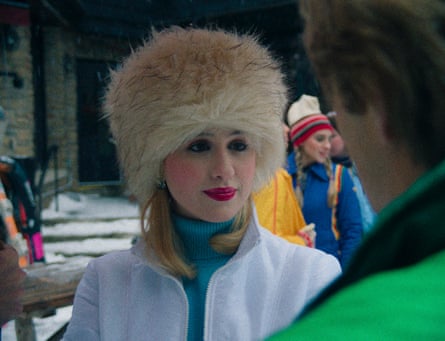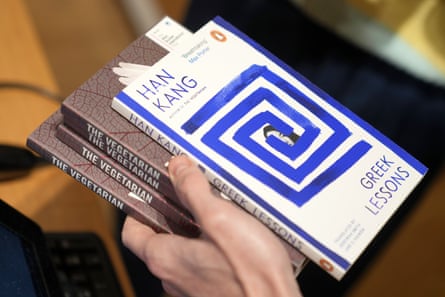UC San Diego has added an innovative prerequisite to ‘prepare students for the future they really will encounter’
Katharine GammonTue 15 Oct 2024 08.00 EDTLast modified on Tue 15 Oct 2024 10.25 EDTShareMelani Callicott, a human biology major at the University of California, San Diego, thinks about the climate crisis all the time. She discusses it with family and friends because of the intensity of hurricanes like Milton and Helene, which have ravaged the southern US, she says. “It just seems like it’s affecting more people every day.”
That’s one reason why she is glad that UC San Diego has implemented an innovative graduation requirement for students starting this autumn: a course in climate change. Courses must cover at least 30% climate-related content and address two of four areas, including scientific foundations, human impacts, mitigation strategies and project-based learning. About 7,000 students from the class of 2028 will be affected this year.
“The most important thing is that UC San Diego wants to make sure we’re preparing students for the future that they really will encounter,” says Sarah Gille, a physical oceanographer at Scripps Institution of Oceanography who was part of the committee to create the new plan.
The requirement won’t add any time to a student’s graduation schedule – it’s designed to be integrated into existing classwork. Forty one-quarter courses meet the goal, including “The Astronomy of Climate Change”, “Gender and Climate Justice”, “Indigenous Approaches to Climate Change” and “Environmentalism in Arts and Media”. Many of the classes that fall under the climate requirement overlap with courses that focus on diversity, equity and inclusion, the school says.
Gille says students are positive about the requirement, which aims to prepare them for future climate-related policies and career opportunities.
“We’re acutely aware as a society of how the climate is changing and how scary that can be, and that probably means that we need to implement some changes in how we do things,” says Gille. “If they’re thinking about the future, they need to be prepared for what the future might bring.” That could mean new opportunities in climate-adjacent fields such as carbon accounting or civil engineering with a climate focus.
Gille says she can stand in front of a class and talk about what the world might look like in 50 or 100 years in terms of temperature increase or sea level rise – “a pretty demoralizing lesson” – but when she ties it to strategic decisions students can make about their own lives, and how to pursue opportunities in the future, “it can become an empowering lesson too”.
The move mirrors a larger sentiment in society. According to a Marist poll this year, 85% of gen Z is very or somewhat concerned about the climate crisis. They are more likely to believe the climate crisis is caused “mostly by human activity” than any other generation. And states from California to Connecticut and New Jersey are now requiring that kids learn about the climate crisis in grade school classrooms.
Louisiana’s flagship university lets oil firms influence research – for a priceRead moreArizona State University has also implemented a new sustainability requirement for graduation this year. Universities such as Columbia, Harvard and Stanford are taking the climate focus a step further and have created entire schools devoted to the issue.
Marcello Ametrano, a communications major and marine science minor, says that even as a non-science student, he’s interested in keeping up to date on the latest science. “It’s really opening my eyes to a lot of what’s going on right now, especially with Hurricane Milton, and why it’s so devastating,” he says. Understanding the oceans is key: “The ocean is kind of saving us from it being so much worse, because it absorbs so much carbon dioxide. So it’s really important to understand the ocean because it directly relates to climate change and essentially what’s going on right now in Florida.”
A wider rollout of climate change courses for graduation is possible across the vast, statewide University of California system, but the school is first focusing on its own plan. “The important thing for UC San Diego was to do what made sense for our campus and to see how this requirement is adopted,” Gille says. “If we can do something that’s bigger, we can potentially create a generation of college graduates who are better prepared for the future.”
Category: NEWS
‘People are complex’- Maria Bakalova on Donald Trump – and playing Ivana in The Apprentice
‘A lot of makeup, a lot of hair’ … Maria Bakalova. Photograph: Gareth Cattermole/Getty Images for IMDbHer breakout role in the Borat sequel grabbed attention after a scene with Rudy Giuliani on a bed. Now she’s playing Trump’s ex-wife in a controversial biopic – but insists it’s not a political film
By Emine SanerMon 14 Oct 2024 00.00 EDTLast modified on Mon 14 Oct 2024 10.28 EDTShareThe week Maria Bakalova was asked to consider playing Ivana Trump for the new film The Apprentice, she was in New York filming something else. With the meeting scheduled for her one day off, she spent the evening before trying to channel Donald Trump’s first wife. The film is set in the 70s and 80s, so she spent hours wading through photos of Ivana in that era. “A lot of makeup, a lot of hair,” she says. Bakalova laughs as she remembers spending the evening experimenting with a mushroom-like hairstyle and “heavy eyeliner with a lot of powder, like inches”, although she didn’t have an Ivana-esque wardrobe – “Am I gen Z or a millennial?” asks the 28-year-old. Either way, “We wear a lot of baggy clothes”, so she chose her most skintight outfit.
She met the director Ali Abbasi in the middle of the day, feeling a little clownish in her Ivana cosplay. They spoke for a couple of hours, “about people growing up in post-communist countries – because [Ivana] was from Czechoslovakia, and I was born and raised in Bulgaria – which shapes your inner world, your thoughts. We talked a lot about the similarities of our stories.”
 View image in fullscreenMaria Bakalova as Ivana Trump in The Apprentice. Photograph: Apprentice Productions/Profile Productions/Tailored FilmsIvana had been a competitive skier, with a place on the national junior team that allowed her to compete outside communist Czechoslovakia in the late 60s. By the mid-90s, when Bakalova was born, Bulgaria was no longer a socialist republic but, for most people, travel outside the country was still rare. As a child, Bakalova, a competitive singer, got to travel to competitions all around Europe. It opened her eyes and instilled a sense of independence.
View image in fullscreenMaria Bakalova as Ivana Trump in The Apprentice. Photograph: Apprentice Productions/Profile Productions/Tailored FilmsIvana had been a competitive skier, with a place on the national junior team that allowed her to compete outside communist Czechoslovakia in the late 60s. By the mid-90s, when Bakalova was born, Bulgaria was no longer a socialist republic but, for most people, travel outside the country was still rare. As a child, Bakalova, a competitive singer, got to travel to competitions all around Europe. It opened her eyes and instilled a sense of independence.
This is Bakalova’s highest profile role since her big break in Borat Subsequent Moviefilm, Sacha Baron Cohen’s 2020 mockumentary sequel about the Kazakhstani reporter Borat Sagdiyev. She played Borat’s daughter, Tutar, in a performance so cringingly brilliant it got her an Oscar nomination. Despite this early success, Bakalova says her agents warned her not to get her hopes up about the role of Ivana – higher profile US actors were also in the running. “What I think is important is that [Abbasi] gave a chance to an eastern European to compete,” she says. “To have the opportunity, rather than just playing a prostitute or a crazy Russian scientist or a mobster or somebody that is just in the background with a few lines.”
It was six months before she found out that she’d got the role, followed by a tortuous journey to get the film made and released. In a Vanity Fair piece, the film’s screenwriter, Gabriel Sherman, detailed the various obstacles – actors who didn’t want to “humanise” Trump, Hollywood studios and streamers who wouldn’t finance it, Trump’s Muslim travel ban that made it difficult for Abbasi, who is Iranian and based in Denmark, to work in the US (as well as the actors’ strikes and a global pandemic). The Apprentice’s largest investor, a film-making son-in-law of a billionaire and prominent Trump donor, reportedly threatened to sink the film once he’d seen it, because of a scene in which the Trump character appears to rape his wife. Ivana alleged Trump raped her in her divorce deposition, but later retracted. Trump’s lawyers sent the film-makers cease-and-desist letters and the big American distributors wouldn’t touch it. “Hollywood fashions itself as a community of truth tellers,” wrote Sherman, “but here they were running from a movie to prepare for a Trump presidency.”
The Apprentice trailer“We’ve been facing a bit of difficulty to release it,” says Bakalova, with comic understatement.
In the film, Trump (played by a toupeed Sebastian Stan) is ambitious but slightly awkward and in the shadow of his father. He is then mentored and moulded by nefarious lawyer Roy Cohn (played, typically magnificently, by Succession’s Jeremy Strong), whom Bakalova describes as “one of the most vicious people of our century”.
A cinephile, Bakalova was desperate to work with Abbasi – she was a huge fan of his work, including Holy Spider, the Iranian serial killer film. She wanted, she says, to be involved in his “dive into the underbelly of the American empire”. The more she researched Trump’s first wife – and the mother of three of his children – the more she found herself fascinated by how much Ivana achieved on her own. “She wanted to be Donald’s partner,” she says. Ivana is credited with promoting the couple’s 80s glitz, she was involved in running part of his businesses and managed New York’s Plaza hotel. “I think she was the reason he achieved so much early because she was very smart, very ambitious.”
In the film, the power balance between Ivana and Donald is in her favour at the start of their relationship; Ivana is horrified at the idea of a prenup, and the measly amount it would give her in the event of a separation, and negotiates a better deal. “I saw an interview with her after the divorce, saying she didn’t know anything about prenups, and why do you need to have them? But if you’re going to play this game that way, if that’s going to be the picture of our marriage, OK, I’m going to play the same way.”
How did she feel about the inclusion of the alleged rape in the film? Trump has always denied the allegations, since retracted by Ivana, who died in 2022. Bakalova says she trusted Sherman. “Do I think it’s important to have it out there?” she says. “Do I think it’s a crucial scene for both of the characters? It is, because we see somebody completely dismissing the person who built him in a lot of ways, who gave birth to his children. Not only physically, but verbally as well.”
She says she doesn’t think it matters if the film “humanises” Trump (reviews have said it lacks bite). “When you dive deeper into a human being, there’s always good and bad sides, and there are always decisions that you make based on circumstances, people you surround yourself with, that change your point of view … I think we should step away from the idea of demonising people or creating idols, because people are complex.”
 View image in fullscreenBakalova and Sacha Baron Cohen in Borat Subsequent Moviefilm. Photograph: Courtesy of Amazon Studios/APThe Borat sequel was released less than two weeks before the 2020 US election, with the words “now vote” flashed up at the end. The Apprentice is also coming out around election time. Is it intended to have any influence? No, says Bakalova – it’s been too long in the making for any kind of intentional timing. “This is not a political film, this is not a hit piece,” she says. Although there are clear echoes, deafening in parts, of who the Trump character will later become. “Will it change opinions? I don’t know. But I feel like the biggest privilege that we have living in a democracy is to share our voices and to have an opinion, one way or another.”
View image in fullscreenBakalova and Sacha Baron Cohen in Borat Subsequent Moviefilm. Photograph: Courtesy of Amazon Studios/APThe Borat sequel was released less than two weeks before the 2020 US election, with the words “now vote” flashed up at the end. The Apprentice is also coming out around election time. Is it intended to have any influence? No, says Bakalova – it’s been too long in the making for any kind of intentional timing. “This is not a political film, this is not a hit piece,” she says. Although there are clear echoes, deafening in parts, of who the Trump character will later become. “Will it change opinions? I don’t know. But I feel like the biggest privilege that we have living in a democracy is to share our voices and to have an opinion, one way or another.”
Bakalova grew up in Burgas, a city on the Black Sea coast. Her mother was a nurse, and her father a chemist; she is an only child. They were considered middle-class, she says, but she remembers as a child that nobody in Bulgaria had much.
“Because of communism and because of inflation, because of a lot of things. I remember back in the 90s, chewing gum going from 100 bucks to 10 bucks to one penny.” They were comfortable, financially, she says, “but it’s not so easy that you can allow yourself to just rest and wait for something to happen. You know that you have to do something if you’re going to succeed.”
Her love of the arts started with music. Her father would play the guitar at home, and she grew up listening to rock music and wanting to emulate those musicians. “Unfortunately, again, growing up in Bulgaria and in a place that still has some kind of patriarchy mindset, playing guitar is a little bit too masculine.” Instead, she became a flautist and was also singing in the choirs that would take her around Europe to various competitions.
When she was 12, she damaged her voice and stopped singing for several months to rest it. “I started reading a lot of books and imagining that I’m in different places, I want to be like these characters. How can you somehow escape real life and imagine that you’re somebody else? That was the starting point of me falling in love with acting.” Later, Bakalova would study at Sofia’s National Academy of Theatre and Film Arts.
She loves theatre and arthouse cinema, but she laughs and says “I’m not going to hide that I was always dreaming about Hollywood and America and cinema.” She remembers drawing the Hollywood sign in an exercise book at school, and writing that she was going to be “a great movie star someday. But of course, my last name finishes with ‘o-v-a’, and I didn’t see that in a lot of credits at the end of films.” One teacher told her that if she wanted to expand beyond Bulgarian film, she should try to get involved in the types of films shown on the European festival circuit.
 View image in fullscreenAmandla Stenberg, Bakalova, Chase Sui Wonders and Rachel Sennott in Bodies Bodies Bodies. Photograph: APBakalova discovered the Danish avant garde Dogme 95 movement and, during her final year of university, used some of her scholarship money to buy flights to Copenhagen for her and her parents. She had an ambitious plan to march into the offices of Lars von Trier’s production company, Zentropa. “I was, like, ‘I’m going there, and I’m going to say, ‘I am willing to work here for free, to study, to learn how you guys do all of these incredible movies.’” She laughs, remembering her and her mother in the rain, Googling the office address. (They were kind, but sent her away, saying she would have to be fluent in Danish, which she then vowed to study.)
View image in fullscreenAmandla Stenberg, Bakalova, Chase Sui Wonders and Rachel Sennott in Bodies Bodies Bodies. Photograph: APBakalova discovered the Danish avant garde Dogme 95 movement and, during her final year of university, used some of her scholarship money to buy flights to Copenhagen for her and her parents. She had an ambitious plan to march into the offices of Lars von Trier’s production company, Zentropa. “I was, like, ‘I’m going there, and I’m going to say, ‘I am willing to work here for free, to study, to learn how you guys do all of these incredible movies.’” She laughs, remembering her and her mother in the rain, Googling the office address. (They were kind, but sent her away, saying she would have to be fluent in Danish, which she then vowed to study.)
Not long afterwards, Bakalova was shooting a Bulgarian French film, Women Do Cry, in which she played a young woman with HIV, when she heard through a friend about a project, which she would later find out was Borat, which required an eastern European actor. So secretive was the process that she feared she was being conned into human trafficking, but she was also tempted by the chance to audition in the UK – she thought she might get a chance, somehow, to meet the British director Andrea Arnold.
In Borat, her character Tutar dreams of becoming like “Princess Melania” and becomes the “gift” Borat is supposed to deliver to one of Trump’s men, first the vice-president Mike Pence, and then Rudy Giuliani, to strengthen relations between their countries. Bakalova was a revelation in the film, infusing her character with a life-changing feminist trajectory while also having to pull off some excruciating scenes with “real” people, including leading an anti-abortion campaigner at a clinic to believe she was pregnant with her father’s baby and describing, to a group of women at a Republican conference, having just masturbated for the first time in the loos.
“I don’t know how I did it,” she laughs. “I don’t know if I will I ever be able to do it again. It’s so strange, and I think that is why Sacha’s work is so brilliant. He challenges people, he does these movies that are like a social experiment of how far can you go?” It was “definitely difficult” she says. With only one shot, did it feel like a lot of pressure not to mess it up, or come out of character? “Sacha was so gracious, he was holding my hand every step of the way and guiding me, and I trusted him.”
 View image in fullscreenBakalova and Sebastian Stan as Ivana and Donald Trump in The Apprentice. Photograph: Pief Weyman/APThere is a scene with Giuliani, which created a lot of attention. Tutar, by now a reporter for a rightwing news channel, is conducting a fawning interview with the former New York mayor and attorney to Trump in a hotel suite, before suggesting they go to the bedroom. Giuliani is filmed lying back on the bed with his hands down the front of his trousers (later, he claimed he was rearranging his clothes after removing a microphone). Was it the plan to get him in the bedroom? “You can only plan so much, but it’s about real people, real places, real situations. You can have goals that you want to achieve, but it depends on the moment. It was ideal to see how far things can get.” Was she nervous? “It was nerve-racking, because you don’t know how these things are going to turn. We worked with a great team of people. We had a great security team, we had a great stunt team. We had a lot of people that made sure we were all safe.”
View image in fullscreenBakalova and Sebastian Stan as Ivana and Donald Trump in The Apprentice. Photograph: Pief Weyman/APThere is a scene with Giuliani, which created a lot of attention. Tutar, by now a reporter for a rightwing news channel, is conducting a fawning interview with the former New York mayor and attorney to Trump in a hotel suite, before suggesting they go to the bedroom. Giuliani is filmed lying back on the bed with his hands down the front of his trousers (later, he claimed he was rearranging his clothes after removing a microphone). Was it the plan to get him in the bedroom? “You can only plan so much, but it’s about real people, real places, real situations. You can have goals that you want to achieve, but it depends on the moment. It was ideal to see how far things can get.” Was she nervous? “It was nerve-racking, because you don’t know how these things are going to turn. We worked with a great team of people. We had a great security team, we had a great stunt team. We had a lot of people that made sure we were all safe.”
It helps, she says, having female producers – Monica Levinson on Borat, and Amy Baer on The Apprentice. “It’s important to have a female perspective behind the scenes, [and] if you’re doing such challenging roles, both as Ivana or Tutar, having a female there looking after you, looking after the story.”
Bakalova has voiced a character in Marvel’s Guardians of the Galaxy Vol 3 (Cosmo the Spacedog), was in the dark comedy Bodies Bodies Bodies and has just finished shooting a family drama, Learning to Breathe Underwater – but in Borat and The Apprentice, her two standout films are about Trump. It is strange, she admits, but adds: “I think Borat is not about Trump. I do find a few similarities between the movies because they explore the American empire, and that land that we all have heard is the place you can feel freedom and opportunity. But both movies show there is always a dark side to it.”
The Apprentice is released in cinemas on 18 October.
Information and support for anyone affected by rape or sexual abuse issues is available from the following organisations. In the UK, Rape Crisis offers support on 0808 500 2222 in England and Wales, 0808 801 0302 in Scotland, or 0800 0246 991 in Northern Ireland. In the US, Rainn offers support on 800-656-4673. In Australia, support is available at 1800Respect (1800 737 732). Other international helplines can be found at ibiblio.org
This article was amended on 14 October 2024. The subject of Maria Bakalova’s quote “one of the most vicious people of our century” was Roy Cohn, not Donald Trump, as an earlier version said. The headline and text have been edited to reflect this.
‘A five-year-old could play this!’ How Razorlight made Golden Touch
‘I was living in flat with a bed, a record-player, a desk and a fridge for beer. I thought, “If I just sit and play three chords for eight hours, hopefully a good song will come”’
 Interviews by Rich PelleyMon 14 Oct 2024 10.15 EDTLast modified on Mon 14 Oct 2024 13.17 EDTShareJohnny Borrell, singer, guitaristI was working at Stamford Bridge, doing match-day security in the players’ tunnel, and walking the players to their cars after the game. I’d stand between the dressing room and the press area, so I got to hear the half-time talks and watch most of the Chelsea games. It was once every 10 days and still the greatest job I ever had. So when Mercury offered me half a million quid, I was kind of like: “Well, I mean, I dunno …”
Interviews by Rich PelleyMon 14 Oct 2024 10.15 EDTLast modified on Mon 14 Oct 2024 13.17 EDTShareJohnny Borrell, singer, guitaristI was working at Stamford Bridge, doing match-day security in the players’ tunnel, and walking the players to their cars after the game. I’d stand between the dressing room and the press area, so I got to hear the half-time talks and watch most of the Chelsea games. It was once every 10 days and still the greatest job I ever had. So when Mercury offered me half a million quid, I was kind of like: “Well, I mean, I dunno …”
I was living above a Nigerian clothes shop called La Chi Chi. I had a bed, a record-player, a desk and a fridge for beers. I was of the opinion that if you want be a songwriter, you have to spend every waking hour writing. I was totally focused. I would sit and think: “Most of my favourite songs are just three chords. If I just play three chords for eight hours, hopefully a good song will come out.”
If the phone had rung two minutes earlier, I might never have written the songI played A, G#m and C#m and sang: “I know a man with the golden hand / You better get him / If you can.” If I can find the first line – so I know who I’m talking to and what I’m trying to say – the rest tends to follow. Queens of Noize DJ Mairead Nash was a good friend of mine and part of our gang. It was us, the Libertines and Mairead. I thought of her story. Once I had written “I know a girl with a golden touch / She’s got enough / She’s got too much” I thought, “Boom! There’s the song.”
I’ve still got all the recordings. Sometimes I listen back and it’s nerve-racking, like watching Gazza in Italia 90 sliding in at the far post and thinking “Just make contact” even though you know he’s not going to. You can hear me coming up with the first verse, which crystallises the song. Then you hear my old flip-phone ringing. I put my guitar down with a clunk and say: “Hello.” If the phone had rung two minutes earlier, I might never have written the song.
Björn Ågren, guitaristWe had a little space for rehearsals in Leyton, east London, near the ice rink. It would have been in the evening because I was the only one with a normal job. I was selling jeans at Diesel so they’d have to wait for me to finish. The start of rehearsal was treat time because often Johnny would go: “I’ve got a new song.” He’d sit on the couch and play it on his electric guitar. I remember being really floored. I told him: “The verse is absolutely brilliant, but the chorus doesn’t lift.” The next rehearsal he had the chorus. I thought: “That’s killer now.”
I’d just learned about chord inversions, commonly used by organ-players so they can sit in one frequency range, which allows for better blending with the other instruments. An upshot is that the hand doesn’t have to move as much. The pre-chorus to Golden Touch is a great illustration of chord inversions on the guitar – two chords repeat twice and I play further and further up the neck. I remember when I saw the sheet music of the first Razorlight album, and looked at my guitar parts I thought I must have looked like a simpleton. “A five-year-old could play this!” I thought.
‘It was nuts what we got away with’: remembering the 00s UK indie explosionRead moreWe were recording some demos and decided that Golden Touch was one of our best songs, so we needed to hone it. We soon had an album’s worth of material but, after changing producers a few times, we ended up scrapping most of what we’d recorded – except for Stumble and Fall, which became our first single, as well as Rip It Up, and the part of Golden Touch from when it starts until when the drums came in. In the last verse of Golden Touch you can hear some thigh slaps and a breathy backing vocal, recorded a few days before we finished the final mix.
I don’t think we’ve done a gig without playing Golden Touch. It’s had a few live iterations over the years. It’s got a good groove so you can really get into it when you play. We do a little section where we go completely dead and people sing along, which is kind of nuts as it’s 20 years old. Even at a festival, when we’re on at 3pm, I’ll think: “Surely there’s not going to be any super Razorlight fans here?” But sure enough, people sing along. It’s amazing that you can create something with that kind of resonance.
Razorlight’s new album Planet Nowhere is released on 25 October. The Up All Night 20th Anniversary show is at Brixton Academy, London, on 21 November.
‘I emerged painfully transformed from her books’- Han Kang readers on her Nobel literature prize
From penetrating words to images that linger in the mind, Han Kang readers tell us what her work means to them
Jem BartholomewTue 15 Oct 2024 06.32 EDTLast modified on Tue 15 Oct 2024 07.05 EDTShareThe 2024 Nobel prize in literature has been awarded to South Korean novelist Han Kang, 53, whose works include The Vegetarian, The White Book, Human Acts and Greek Lessons.
The Nobel committee praised Han’s “intense poetic prose that confronts historical traumas and exposes the fragility of human life”.
The Guardian asked readers of Han’s books to share what her writing means to them, with dozens getting in touch about their thoughts.
‘I emerge painfully transformed from all of Han Kang’s books’ View image in fullscreenMia Kovačić says she emerges ‘painfully transformed from all of Han Kang’s books.’I read The Vegetarian first. I found it subversive, poetic, dark, violent, and genuine. It was something unlike anything I had read before and it seemed to stand in a league of its own.
View image in fullscreenMia Kovačić says she emerges ‘painfully transformed from all of Han Kang’s books.’I read The Vegetarian first. I found it subversive, poetic, dark, violent, and genuine. It was something unlike anything I had read before and it seemed to stand in a league of its own.
It’s a deeply feminist book, purely because it’s a deeply human book that deals with a woman breaking with everything she has ever known – her family, her husband, all of society. It was a transformative read and an unpretentiously radical book.
Human Acts was traumatising in its immediacy – it was chilling and violent and I felt like I was there, with those students [during the 1980 student protests]. I emerge painfully transformed from all of Han Kang’s books.
Having raved about her to anyone who would listen, I was really thrilled to see her get this recognition. She is a unique voice that deserves to be heard everywhere in the world. Mia Kovačić, 34, communications director, Paris
‘It made me weep for the power of kindness’ View image in fullscreenKatherine Wildman says she devoured The Vegetarian during a train journey in one day.I went to Skiathos, Greece this year and took Greek Lessons with me. I have recommended it to so many people since, saying that nothing happens but everything happens … it made me weep for the power of kindness.
View image in fullscreenKatherine Wildman says she devoured The Vegetarian during a train journey in one day.I went to Skiathos, Greece this year and took Greek Lessons with me. I have recommended it to so many people since, saying that nothing happens but everything happens … it made me weep for the power of kindness.
Next was The Vegetarian, which I’ve had on my bookshelf for years. I read that one on the train to London and devoured it in a day. It says everything and everything happens.
Her writing is compelling and urgent and true. It’s a sucker punch and I’m so very glad I found her work. Katherine Wildman, 50, copywriter, near Newcastle
‘It always left intense images in my mind’ View image in fullscreenNoah Kim says Han Kang captures the experience of ‘individuals who have fought for their existence’.Han Kang’s works comfort the grief of Korean contemporary history and society. I’ve been soothed by them and influenced by their narratives, which have always left intense images in my mind and affected my writing and drawing. Like the endless darkness and solitude of I Do Not Bid Farewell, or the deprived hopes and misaligned yearnings of Human Acts.
View image in fullscreenNoah Kim says Han Kang captures the experience of ‘individuals who have fought for their existence’.Han Kang’s works comfort the grief of Korean contemporary history and society. I’ve been soothed by them and influenced by their narratives, which have always left intense images in my mind and affected my writing and drawing. Like the endless darkness and solitude of I Do Not Bid Farewell, or the deprived hopes and misaligned yearnings of Human Acts.
I was in London studying the first time I read The Vegetarian. When I finished the book, I felt as if I’d watched a work of contemporary visual art – it embodied the powerful visualisation of its narrative. It captured me, tightly.
One great strength of her novels is to bring out the intangible lives of little people throughout Korean history and society, their historical and social griefs and agonies that are often disregarded. She captures the voices, and resistance, of vulnerable people – individuals who have fought for their existence. Noah Kim, 33, draws illustrations and writes short stories for children’s books, Seoul, South Korea
 View image in fullscreenA book store worker handles books by Han. Photograph: Kin Cheung/AP‘Han Kang’s writing erases distance’
View image in fullscreenA book store worker handles books by Han. Photograph: Kin Cheung/AP‘Han Kang’s writing erases distance’ View image in fullscreenJenni Reid was deeply affected by Human Acts.I am currently studying Korean and was loaned a copy of Human Acts by my professor. Once I started reading I couldn’t put it down, I read late into the night, straight to the final page.
View image in fullscreenJenni Reid was deeply affected by Human Acts.I am currently studying Korean and was loaned a copy of Human Acts by my professor. Once I started reading I couldn’t put it down, I read late into the night, straight to the final page.
I had been familiar with the events of 1980 [the Gwangju uprising and brutal repression], but the story, as it shifted from one narrator to the other, affected me deeply. The level of violence perpetrated against the students – the way a nation was terrorised – is something we see repeated often across the world. It is something I fear may unfold in the US.
But there can be a certain distance when we see media reports of events like this. What Han Kang’s writing has done is erase that distance – her words penetrate straight through the heart, and I am left feeling the loss of those children as if they were the classmates of my own son. Jenni Reid, works with children with special needs, Syracuse, New York
‘I was haunted for months afterwards’ View image in fullscreenHugo Maio says some scenes haunted him for months afterwards.I was haunted by Han Kang’s Human Acts for months after reading it. I feel it creeping up sometimes, unannounced, and for no discernible reason. There are images in that book that will never leave me, like one scene at the beginning of Human Acts – a horror that immediately casts a shadow over the rest of the book.
View image in fullscreenHugo Maio says some scenes haunted him for months afterwards.I was haunted by Han Kang’s Human Acts for months after reading it. I feel it creeping up sometimes, unannounced, and for no discernible reason. There are images in that book that will never leave me, like one scene at the beginning of Human Acts – a horror that immediately casts a shadow over the rest of the book.
For me, what’s special about Han Kang is that the severity of her themes and the raw brutality of the things she writes about are coupled with this intensity of language, this shameless, ceaseless, horrible beauty. She’s a writer who’s unafraid of bringing powerful emotions to the table, whose grasp of measure and proportion is admirable, all in service of evoking the unfathomable, that spontaneous violence that underlies our quotidian and that may be unearthed at any time.
I was jumping with joy for hours after the Swedish Academy’s announcement. There’s always been a dearth of attention to east Asian novels in the west, where a sort of tokenism is often accompanied by lack of any proper interest, particularly for women’s writing, a dearth that has only in recent years started to be redressed. Hugo Maio, 32, PhD researcher studying medieval Portuguese literature, Coimbra, Portugal
‘People falling asleep wasn’t that unusual’- experimental pioneers the Necks on four decades of improvising
They never rehearse. Their music is borderline indescribable. And their live shows have become the stuff of legend. Now on their 29th album, Bleed, the trio look back on creating a career from thin air
Get our weekend culture and lifestyle emailAndrew StaffordFri 11 Oct 2024 19.00 EDTLast modified on Fri 11 Oct 2024 19.20 EDTShareThey were the overnight sensation 30 years in the making. In 2017, a review appeared in the New York Times: “My obsession with the Necks, the greatest trio on Earth”. It followed the LA Times, which called them “among the world’s greatest forces in music”. The Washington Post, in 2020, was slower to catch on, describing one of their songs as “umpteen metric tons of bouncing-clinking stuff being discarded into an abyss of stairs” (complimentary, of course).
It’s a good thing they’re smart enough not to pay attention to any of it. The Necks’ music is so ephemeral that no one can be expected to respond the same way. There are no set lists. No expectations. And definitely no requests. There is only trust: that the three of them will quite literally make it up as they go along.
It was in 1986 that bassist Lloyd Swanton, percussionist Tony Buck and pianist Chris Abrahams, all seasoned players, coalesced around Abrahams’ description of their basic principle: “What if we just, you know, played music?” On Friday, they released Bleed, their 29th album (including live recordings, which – being improvised – are as unique as the rest).
Originally, the Necks were an entirely private project. There were around eight months of “rehearsals” at the University of Sydney’s music department with no thought of playing live, until the person who allowed them access to the room invited them to perform at an afternoon concert series.
Sign up for the fun stuff with our rundown of must-reads, pop culture and tips for the weekend, every Saturday morning
Their early shows weren’t exactly ecstatically received. “People falling asleep wasn’t that unusual,” Abrahams says. “I remember … we’d finish a set and several people were actually lying on their backs.”
 View image in fullscreen‘We wanted to pursue the idea of being entirely in the moment’: the Necks on making it up, live. Photograph: Nabeeh SamaanReally, the Necks were just inviting the audience to enter the same zone they were aiming for: a trance, where the instruments appeared to play them, instead of the other way around. They soon hit upon the closest they’d ever get to a formula – one of them would start (though no one knew who), then the others would enter. By degrees, a piece would take shape.
View image in fullscreen‘We wanted to pursue the idea of being entirely in the moment’: the Necks on making it up, live. Photograph: Nabeeh SamaanReally, the Necks were just inviting the audience to enter the same zone they were aiming for: a trance, where the instruments appeared to play them, instead of the other way around. They soon hit upon the closest they’d ever get to a formula – one of them would start (though no one knew who), then the others would enter. By degrees, a piece would take shape.
Now, Swanton says, “we can do it in our sleep, though I hope it doesn’t sound like that”. The challenge, early on, was to get themselves into the necessary mental state to fall back on that original principle: to just play. “We wanted to pursue the idea of being entirely in the moment.”
Sarah Blasko: ‘I’m still a recovering Christian. I had to remodel my brain to be here and enjoy life’Read moreAll are virtuosos. Jim Moginie, who has played with Abrahams both solo and with Midnight Oil (for whom Abrahams was briefly a touring member), calls him as “probably the premier piano player in this country. We were using about one per cent of his brain with what we were doing.”
There’s an alchemy that happens live, Moginie says: “It’s not jazz, it’s something else. It’s improvised music, and the fact that they make it up every night – that’s part of the brinkmanship of it, isn’t it? They’re straddling the tightrope, the spotlight’s on them and you don’t know what’s going to happen.”
“Something else” might be the only way to label the Necks. Their own Bandcamp describes them as “not entirely avant-garde, nor minimalist, nor ambient, nor jazz”. Swanton smiles: “It’s not that unusual to have trouble describing music in words; that’s kind of inherent in the act of making music and sharing it.”
 View image in fullscreenHow to categorise a band like the Necks? ‘I don’t mind being thought of as all of the above, or none of the above.’ Photograph: Camille WalshAbrahams, for his part, is unfussed. “I have no problem with people categorising us however they see fit. Every listener has the right to interpret what we do however they feel, and it’s a human need to categorise and to put a name to things. I don’t mind being thought of as all of the above, or none of the above.”
View image in fullscreenHow to categorise a band like the Necks? ‘I don’t mind being thought of as all of the above, or none of the above.’ Photograph: Camille WalshAbrahams, for his part, is unfussed. “I have no problem with people categorising us however they see fit. Every listener has the right to interpret what we do however they feel, and it’s a human need to categorise and to put a name to things. I don’t mind being thought of as all of the above, or none of the above.”
skip past newsletter promotionSign up to Saved for Later
Free newsletterCatch up on the fun stuff with Guardian Australia’s culture and lifestyle rundown of pop culture, trends and tips
Privacy Notice: Newsletters may contain info about charities, online ads, and content funded by outside parties. For more information see our Privacy Policy. We use Google reCaptcha to protect our website and the Google Privacy Policy and Terms of Service apply.after newsletter promotion
That doesn’t mean there aren’t plenty of musical reference points for what the Necks do. The atmospheric stillness and slow build of Miles Davis’s fusion breakthrough In a Silent Way comes to mind. So too the ambient works of Brian Eno, who invited the Necks to perform as part of a supergroup including himself and Underworld’s Karl Hyde in 2009.
The Necks review – a magical mystery tour de forceRead moreBut no group of musicians has created an entire career out of thin air in quite the same way. The Necks don’t rehearse: “Even before we were performing live, I wouldn’t call it rehearsing, because we had nothing to rehearse towards,” Swanton says. Recordings are a little fussier, technically speaking, but still, nothing is preconceived.
There was just one occasion in their career, Swanton says, when he experienced stage fright. Percussionist Tony Buck had relocated to Berlin, and the group hadn’t played for a year. “We’d started to get a bit of a reputation, and we were about to go on stage in front of a room full of hundreds of people. I was just quietly questioning myself, can we actually do this?”
 View image in fullscreen‘Can we play this much and not get jaded and disillusioned?’: the Necks’ Lloyd Swanton. Photograph: Traianos PakioufakisThey could. And they continue to do so, to the point where the group is more in demand than ever, especially in Europe and America. Like their music, their career has built by increments. “The question now is, can we play this much and not get jaded and disillusioned? And yet, every time I play with the band, I can’t believe how we just get up there, and out it comes,” Swanton says.
View image in fullscreen‘Can we play this much and not get jaded and disillusioned?’: the Necks’ Lloyd Swanton. Photograph: Traianos PakioufakisThey could. And they continue to do so, to the point where the group is more in demand than ever, especially in Europe and America. Like their music, their career has built by increments. “The question now is, can we play this much and not get jaded and disillusioned? And yet, every time I play with the band, I can’t believe how we just get up there, and out it comes,” Swanton says.
Occasionally, he confesses, he pines for the early days, when it was just the three of them. “I still sometimes feel it’s kind of a shame that we went public, so to speak, and I wonder whether we ought to form another private band, because there’s something very special about that.”
Perhaps. But if the Necks had remained behind closed doors, they would have denied the rest of us something very special too. For now, they’re just making it up as they go.
The Necks’ new album, Bleed, is out now via Northern Spy. They tour across Europe in November and Australia in January and February 2025
Nut bans little help to allergic air passengers
 Getty ImagesAirlines often ask passengers not to consume nuts on boardAsking aeroplane passengers not to eat nuts is unlikely to prevent an allergic reaction mid-flight – but cleaning their seat with a wet wipe could, allergy specialists say in a review of the latest evidence.
Getty ImagesAirlines often ask passengers not to consume nuts on boardAsking aeroplane passengers not to eat nuts is unlikely to prevent an allergic reaction mid-flight – but cleaning their seat with a wet wipe could, allergy specialists say in a review of the latest evidence.
Small bits of food can often stick to seats, tray tables and screens and be transferred from hands to the mouth or face.
But there is no evidence nut allergens are spread around the cabin by ventilation systems, the review says.
When turnaround times between flights are short and there is little time for cabin cleaning, passengers with food allergies should be allowed to board first and clean their seat themselves, experts advise.
The UK Civil Aviation Authority asked experts to review the risks of flying for people with food allergies.
There is a common perception peanut particles can be spread through the air in a plane – and airlines often make announcements asking passengers not to eat nuts on board.
But review author Prof Paul Turner, clinical professor in anaphylaxis and paediatric allergy at Imperial College London, said passengers should not worry about food being transmitted in the air.
"We didn’t find any evidence that nut particles could travel through the cabin ventilation system on airplanes and cause reactions," he said.
"On top of that, the vast majority of people with food allergies don’t react to the smell of food, even if they are allergic to very small amounts.”
 Getty ImagesPeanuts are the most common food to cause dangerous allergic reactions, known as anaphylaxis
Getty ImagesPeanuts are the most common food to cause dangerous allergic reactions, known as anaphylaxis
Air circulates across the cabin, not through it, and efficient filtering systems remove the vast majority of dust, vapours and food particles from the air passengers breathe, the review says.
Air is completely exchanged every three to four minutes during a flight.
In hospitals and classrooms, that happens every 10 minutes.
'Board first'Previous studies show peanuts can be detected in the air only at very low levels and very close to the nuts themselves.
While vapours from fish or seafood and wheat-flour particles in the air can cause allergic reactions, those are exceptions.
Instead, the real danger comes from passengers on previous flights leaving peanut residue on the seats, trays, floor and entertainment screens.
If seat areas are not properly cleaned between flights, small pieces of nut may end up on the next passenger's hands and face, the review says.
"If food-allergic people can board first, and have time to clean their seat area with something like a baby wipe or antibacterial wipe, they are much less likely to have accidental reactions," Prof Turner said.
'Passengers cleaning'Nut bans on flights may in fact give passengers a false sense of security, the authors say in the BMJ journal Archives of Disease in Childhood.
People at risk of potentially life-threatening allergic reactions, known as anaphylaxis, should always carry two adrenaline pens.
And airlines should consider keeping a supply of them onboard in case of emergency and have clear policies on food allergies on their website.
"A key take-home message is the importance of passengers cleaning their seat area, including the tray table and the seat-back entertainment system," said Simon Williams, chief executive of charity Anaphylaxis UK.
About one in 50 children and one in 200 adults in the UK have a nut allergy, according to the charity.
Shrunken heads withdrawn from auction after backlash
Recently, an auction house faced significant backlash after putting human and ancestral remains up for sale. This decision prompted them to withdraw the items in response to criticism from indigenous groups and museums. Located in Tetsworth, Oxfordshire, Swan Auction House had listed a range of controversial artifacts, including skulls and shrunken heads collected from various global communities.
In an interview with the BBC, Laura Van Broekhoven, director of the Pitt Rivers Museum in Oxford, voiced her outrage over the auction and praised the decision to remove the remains from the sale. She highlighted the ethical issues such a sale raises, stating, “This is really problematic for many communities around the world. The fact that these objects were taken is incredibly painful, and putting them up for auction is deeply disrespectful and inconsiderate.”
Van Broekhoven acknowledged the historical context of these items, explaining, “While we understand these items were collected in the 19th and 20th centuries, seeing them for sale in 2024 is quite shocking.” The auction included shrunken heads from the Jivaro people of South America, skulls from the Ekoi people of West Africa, and a horned human skull from the Naga people of India and Myanmar. This led the Forum for Naga Reconciliation (FNR) to reach out to the auction house to demand the repatriation of these artifacts.
The FNR is among several indigenous groups currently engaging with the Pitt Rivers Museum concerning the museum’s collection. Van Broekhoven shared, “We are actively reaching out to communities to understand how they want us to care for these human remains, or if they prefer repatriation. This is feasible when items are preserved in public collections like ours. We can be held accountable, whereas once they are auctioned off, they are removed from public use and communities lose contact.”
While she commended the auction house for its decision to withdraw the remains, Van Broekhoven raised concerns about their future care.
Staring at the screen without exercising can easily lead to obesity
What’s the strongest argument against excessive screen time for children? It revolves around the concept of “opportunity cost.” When children spend time on screens, they miss out on valuable learning experiences. Dr. Aminuddin emphasizes that for toddlers to develop in terms of perception, language, movement, and social-emotional skills, they need to engage with the world firsthand. This includes playing with toys, exploring the outdoors, conducting experiments with various materials, and having interactive conversations with nurturing caregivers. When children are glued to screens, they forfeit opportunities for growth and learning.
This concern is even more pronounced for infants and toddlers, as there is no substantial evidence that they can learn anything meaningful from screens.
For preschool-aged children, research suggests shows like “Sesame Street” can enhance literacy and social skills, but this benefit only arises with limited viewing time. Excessive early exposure to digital media has been linked to obesity, largely due to reduced physical activity and outdoor time, as well as increased exposure to advertisements for sugary foods and beverages.
Children who spend prolonged periods in front of screens also miss out on quality interactions with their caregivers. As a result, they hear fewer words throughout the day, leading to delays in cognitive, language, and social development. Some studies have found a correlation between excessive screen time and behavioral issues, including ADHD; however, these studies do not establish a direct cause-and-effect relationship.
An important question arises: Does screen time alter neurological connections in infants and toddlers? A small MRI study focused on preschoolers found that children who viewed screens for more than the recommended hour daily showed poorer development of the brain’s white matter, the part responsible for language and early literacy skills. However, Dr. Aminuddin notes that evidence regarding direct effects of screen time on brain development remains inconclusive.
Experts recommend that infants should be encouraged to play and explore rather than stare at screens. According to Harvard University’s Center on the Developing Child, over one million neural connections are formed every second in the first three months of life, with crucial development driven by “serve and return” interactions between the infant and caregiver. When a baby coos or expresses a certain posture, a nurturing adult responds effectively. Without these significant interactions, the brain cannot develop positively.
However, such interactions do not occur when children are fixated on screens. A recent study in Japan highlighted that the more time one-year-olds spent in front of screens, the more likely they were to experience delays in communication and problem-solving skills by ages two to four. Particularly alarming was the finding that those who watched screens for over four hours a day showed especially pronounced delays.
Professor Nishi, a specialist in psychotherapy, explains that there is no need to shield infants’ eyes when a television is on in the home. “There’s been a lot of fear-based messaging directed at parents, but there’s no evidence that occasional exposure to television screens harms infants,” he says.
Property Demolition- Kwara Education Trust Fund Chairman, Mustapha, Resigns
In a surprising twist, AbdulHakeem Usman Mustapha, a Senior Advocate of Nigeria (SAN), has announced his resignation as the chairman of the Kwara State Education Trust Fund. Mustapha, who is the brother of former House of Representatives member and All Progressives Congress (APC) leader Hon. Mashood Mustapha, decided to step down in light of a contentious property demolition involving his brother’s business, Crystal Plaza, which occurred last Sunday in Ilorin.
The demolition of the property on Sulu Gambari Road has sparked considerable public outcry in Kwara State, with residents sharing a range of opinions on the government’s decision. The state administration has defended the demolition, claiming it was necessary because the property didn’t comply with its original approval for use.
Mr. Sulyman Kareem, Chairman of the Kwara State Geographic Information Service (KW-GIS), explained, “The removal of the Crystal corner shops is based on new findings that reveal serious violations of the land use approval granted to the owner on March 22, 2013. This approval was specifically for a commercial car park.” Kareem emphasized that the unauthorized structure hindered urban planning, road expansion, and environmental protection, which are crucial to the government’s urban renewal efforts.
In his resignation letter to Governor AbdulRahman AbdulRazaq, dated October 7, 2024, Mustapha stated, “I hereby resign as the chairman of the Kwara State Education Trust Fund, effective today, October 7, 2024. I am grateful to the Kwara State Government for the opportunity to serve during my tenure.” This unexpected resignation leaves many in the community reflecting on the ramifications of Mustapha’s decision amid the surrounding controversies.
State Administration for Market Regulation- China’s corporate credit index was stable with improvement in August
On October 9, a report from the “City Talks” WeChat public account shed light on China’s business credit landscape for August 2024. The China Enterprise Credit Index reached 157.05 points, signaling a stable and slightly improving credit environment for businesses. Let’s explore some of the key features of this month’s credit dynamics.
To start, there has been a modest improvement in national enterprise credit levels. The China Enterprise Credit Index rose by 0.41 points from July. Key indicators such as reliability, operational performance, financial stability, regulatory compliance, and oversight remained consistent. Despite factors like extreme temperatures, heavy rainfall, and seasonal downturns in specific industries, businesses managed to maintain stable operations. The effectiveness of macroeconomic policies continues to yield positive outcomes, fostering high-quality development. However, the report also pointed out that increasing risks are associated with related enterprises and personnel, due to a more complex international landscape and domestic demand shortfalls, highlighting the need for improved risk prevention strategies.
Regionally, there was an optimistic trend in credit levels across various provinces. In August 2024, the top five provinces ranked by their credit index were Beijing, Anhui, Fujian, Shaanxi, and Zhejiang. Overall, businesses in these regions saw improved credit levels compared to July, with Jilin, Hainan, and Tianjin experiencing substantial increases. Additionally, provinces like Henan and Guangdong continued to strengthen their intellectual property holdings, such as trademarks and patents. Notably, regions including North China, East China, Central China, and Northwest China recorded credit levels exceeding the national average, with East China leading with an average credit index of 159.12.
When looking at industry performance, credit levels showed a balanced improvement. By August 2024, the average credit index across all sectors indicated growth compared to July, with narrowing gaps among them. The service sector, particularly in accommodation, catering, and scientific research and technical services, displayed robust growth. The manufacturing sector also maintained a steady upward trajectory from February through August. Furthermore, sectors like water conservancy, environmental protection, and public facility management continued their positive trend, while agriculture, forestry, animal husbandry, and fishery sectors saw significant gains in their credit indices.
In conclusion, the business credit situation in August reveals ongoing improvement and stability, highlighted by meaningful advancements in building robust credit systems for enterprises. Nevertheless, the report cautions against rising instability and uncertainties in the external environment and emerging challenges facing developing and transitioning sectors. To sustain the ongoing economic recovery, it will require a collective effort to effectively utilize credit as a catalyst for high-quality development.
